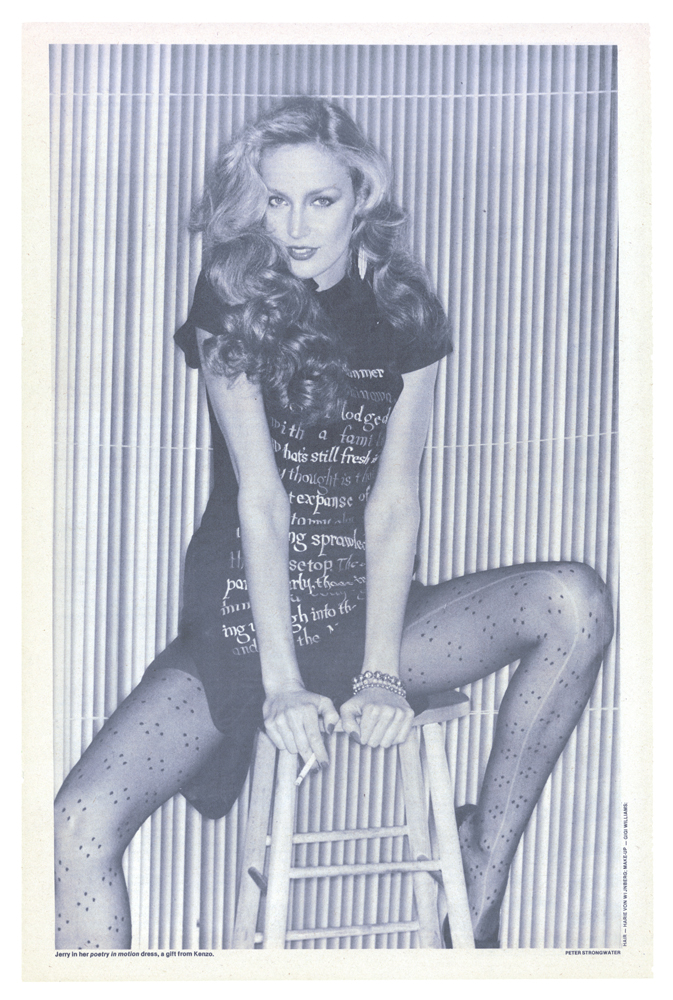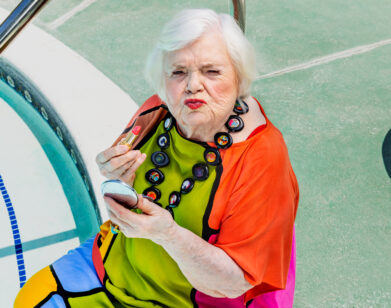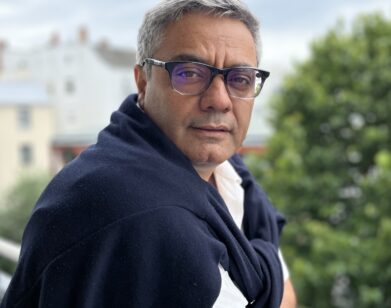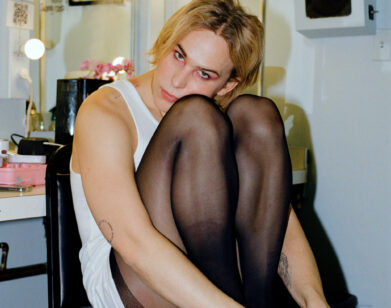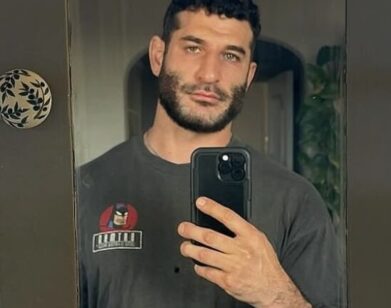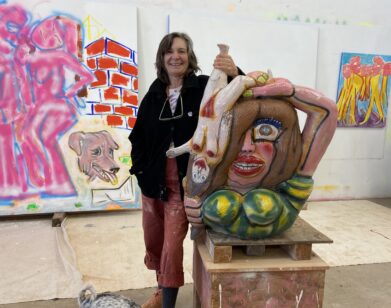New Again: Jerry Hall
News broke yesterday that former actress and supermodel Jerry Hall is engaged to Rupert Murdoch. Though the announcement came in a charmingly old fashioned way (via the Births, Marriages, and Deaths section of Times of London, which Murdoch owns), nearly every other outlet was quick to speculate—why are the two getting married, and why now? We don’t care to speculate why Hall, who had a longstanding relationship and mothered four children with Mick Jagger, is marrying Murdoch, but rather decided to use this as an opportunity to reprint an interview between her, Andy Warhol, and Bob Colacello from 1978. At the time, Hall was in the midst of her heyday as a model, having already worked with legendary photographers including Irving Penn, Richard Avedon, Norman Parkinson, and more. Here, the trio speak about everything from her pet alligator to smuggling film out of Russia, running away to Paris, and marriage (Hall only liked the idea of being engaged, not necessarily the final step).
Jerry Hall: Tall Tales of Texas
By Bob Colacello and Andy Warhol
Redacted by Chris Hemphill
Saturday, April 22, 1978, 1:00pm. Andy Warhol, Bob Colacello, and Jerry Hall, the Texas cyclone of international modeling, are taxiing down Park Avenue toward Quo Vadis. Jerry is wearing a purple, mauve, lavender, and lilac print chiffon dress by Odicini of Rome, a red bullfighter’s hat, and black flats. She speaks in an anything-but-typical Texas drawl with overtones of drama and undertones of satire.
(Tape #1, Side A.)
JERRY HALL: It’s like summer.
ANDY WARHOL: I know, overnight. It happens so fast.
HALL: Mmm. I’m going to go riding in the park tomorrow.
WARHOL: I heard that everybody recognizes you and they chase your horse. What do you do?
HALL: No, I race. If someone’s on a horse they always say, “Do you want to race?” and you race. It’s fun. There’s no one there. It’s around the reservoir and there’s just a few joggers. I went with my sister Cyndy because we used to ride in Texas races.
WARHOL: There’s so many joggers. It’s just incredible.
HALL: I know. They’re so serious. They go out when it snows.
BOB COLACELLO: That’s such a beautiful dress. It’s like a scarf on top. Who made that?
HALL: An Italian—Odicini.
COLACELLO: Where’s that hat from?
HALL: Hunting World.
COLACELLO: Is that what you ride around the park in?
HALL: No, but I’m getting this great riding outfit made in all black and red.
WARHOL: Was that a cowboy hat befre you bent the sides down?
HALL: No, it’s a bullfighter’s hat—a torero! But you don’t run into many bulls in New York.
WARHOL: Where are all the bulls?
HALL: We used to have a pet bull called Blackjack. But after it got big…
WARHOL: You ate him?
HALL: They did. I didn’t.
They arrive at Quo Vadis, 26 East 63rd Street, and go inside.
THE CAPTAIN: Bonjour, M. Warhol, comment allez-vous?
WARHOL: Fine.
THE CAPTAIN: May I get you something to drink?
HALL: I’ll have a Perrier with lemon and no ice.
WARHOL: I’ll have the same thing. You don’t drink much?
HALL: I just drink wine and champagne.
WARHOL: I’ve been getting drunk lately.
HALL: Do you like tequila?
WARHOL: I love it. And Puerto Rican rum is great, too. Last night I was at Trader Vic’s and I drank these rum drinks that were so stiff. They’re called Navy Grogs or something.
HALL: Once me and my sister were in Martinique and we had this drinking contest…
WARHOL: You have a twin sister? I didn’t know that.
HALL: Yes, Terry Jay and Jerry Fay. She drank 16 tequilas and I drank 11 and then we went straight to our room and passed out.
WARHOL: How many other brothers and sisters do you have?
HALL: Four sisters. My father was a Staff Sargeant in the Army who just wanted boys and had all these girls. After he had twin girls he quit the Army.
COLACELLO: What did he do then?
HALL: He drove a truck with explosive chemicals cross-country.
WARHOL: Does your twin sister look just like you? Is she short, fat…?
HALL: No, she’s very pretty. She’s about a half an inch shorter than me and she has brown naturally curly hair and matching brown eyes.
WARHOL: Are all your sisters as tall as you?
HALL: No, one is like 5’3″, one is 5’7″, and one is 6′, my big sister, Cyndy. You met her, didn’t you? She was Girls’ Champion Bull-rider of Texas.
COLACELLO: Does she model, too?
HALL: She did. She works part-time in a chemical lab and then she does all kinds of cocktail waitress jobs and she does makeup for movies and walk-ons in soap operas.
WARHOL: God. How did you start modeling? I’ve known you since you were a baby, right?
HALL: Since 17 in Paris. I went to Paris when I was 16. Me and my best girlfriend took all these special courses in high school and graduated a year ahead of our class and then I had this car accident and got insurance for it—$800. I didn’t get hurt at all, but the other people got hurt really bad. And then…
WARHOL: You got a new face out of it?
HALL: No, but I got $800 so I got a backpack and a sleeping bag and left. My father said I couldn’t go. He wanted my money.
WARHOL: Why did you choose Paris? Did you see it in movies?
HALL: Yes, I used to always lie around and dream about Paris and about being a model and movie star there.
WARHOL: But why Paris and not New York?
HALL: New York was American and not as foreign and exotic.
WARHOL: Did you get work right away?
HALL: Yes, my first job was with Helmut Newton.
WARHOL: How did you meet him?
HALL: I was on the beach sun tanning and Claude Haddad, who’s now my agent in Paris, came up and said, “Do you want to be a model?” and gave me his phone number. So I went back to Paris and he moved me into an apartment with Tom Cashin. Then they sent me to Helmut and he liked me so I did that job with leather and whips and stuff. I was just going to spend the summer there but I never made it back. And he and Antonio [Lopez, illustrator and model-maker] were friends from the start. When I met him I had on this gold skin-tight suit, a blue feather boa, and gold feathers pasted on my forehead.
WARHOL: Now Tom Cashin’s a big star in The Best Little Whorehouse in Texas. He really turns on onstage. He’s not shy at all.
HALL: He was one of the Champions of the World in the Irish Jig.
WARHOL: But he turns the Irish Jig into a Western tap dance and it’s so different.
HALL: I went to one of his competitions. He had on a skirt and socks and everything. It was great.
WARHOL: What are we going to eat? I always want something different. What’s different?
COLACELLO: Shad roe.
Orders.
WARHOL: I think people make too much eating, anyway. They spend too much time thinking about it. I guess it’s all business. It’s what living’s about—you make money to spend money. Do you want some champagne?
HALL: Yes, that would be great. When you stay in those cold winter places with fireplaces you get up and have steaming kippers and then you go for a walk and then you come back and have lunch—there’s nothing to do but eat.
WARHOL: Isn’t that terrific? Did you go on a lot of trips to places like Switzerland when you were working in Paris? You did a lot of modeling so you must have.
HALL: Yes, I went on a lot of trips in the beginning but not much. Last time I was there for six months but I went on a three-week trip to India. It’s great but it’s so far away from everything. Plus you have to spend three weeks with people you don’t know.
WARHOL: Photographers make you work so hard.
HALL: In India we had to wake up at 4:00 in the morning and work till sunrise, then work at sunset.
WARHOL: Have you worked with a lot of the great photographers?
HALL: Yes. I worked with Penn, Avedon, and with Norman Parkinson, who’s wonderful. We went to Russia together. He gets up every morning at 6:00 and runs around. He’s so polite. He says, “Alright, my little chicken, if you’ll just pose over there…” He’s so charming. He eats pasta late at night and drinks vodka all day long and carries on all day and he’s tall and thin. He kissed me in an elevator once.
COLACELLO: In Russia?
HALL: No, in Italy.
COLACELLO: You’ve been around. Where did you grow up?
HALL: I grew up in the middle of nowhere—Mesquite, Texas. Do you know mesquite trees, those trees with thorns on them?
COLACELLO: They make tequila from mesquite trees.
HALL: Yes, it’s named after them. It’s real Texas, real flat. I could lie on the ground and see forever. Mesquite Championship Rodeo is the biggest thing in town. It’s one of the biggest rodeos in Texas.
WARHOL: The last time I was in Texas I met Larry Mahen, the rodeo star. Do you know him at all?
HALL: My sister Cyndy went out with him.
WARHOL: He’s got the best looking ass in the world. It must be from riding horses. Do you get good behinds from riding horses?
HALL: Right. That’s what I really like about riding. It turns your rear to rock. Mine used to be completely flat.
WARHOL: I like that new commercial on TV that has two twins on it.
HALL: It’s wonderful—”I like the flat look.” “I like the fuller look.”
WARHOL: But is it actually something in the panties or is just the way they’re cut?
HALL: It’s the way they’re cut. The one that has a seam probably has more room for your ass to stick out.
COLACELLO: It’s like Italian-cut underwear, Andy.
HALL: Do boys look at each other’s crotches?
WARHOL: Not normal boys. Why, do girls look at each other’s busts?
HALL: I never do.
WARHOL: I like small breasts the best.
COLACELLO: What TV commercials do you have on now?
HALL: I have three on now and one I did last week, Olympus Cameras—Dr. Pepper, Metropolitan Life Insurance…
(End of Side A.)
(Take #1, Side B.)
HALL: …and I’m in a showroom and they’re talking about life insurance and they’re pinning clothes on me and this guy walks by and smiles and says, “Hello.” I don’t have too much to say.
WARHOL: I met Matt Collins yesterday. He just sold his life story to Alan Carr. He ran away from home at 14 and became a horse trainer. I don’t know how he became a model.
HALL: That’s what I used to do. My sister married this guy who had a ranch. When we were 14 or so, me and my twin sister used to visit them in the summer and we used to work to pay our board. We had chores. I used to wake up early and shovel the shit out of the stalls. We’d wash down the studs and run them around with a whip and train them. It was great. And I used to take kids on trail rides out in the woods. They’d get bucked off and kicked in the heads. And we used to take these jobs where we’d break people’s horses. These horses would be so damn horrible. We’d have to ride them everyday for three weeks and get bucked off and run into the trees and everything until they were so well trained kids could ride them. They used to pay us $17 for three weeks.
COLACELLO: What did you spend your $8.50 each on? Lipstick?
HALL: No, we used to spend it on shoes.
COLACELLO: Do you want to go into acting?
HALL: Yes. I was at my acting class last night. I study with this guy, Jack Walzer, who Dustin Hoffman took me to. Me and Lisa Taylor has this walk-on in Marathon Man but they cut it out. All we did was walk down the street being models when this old lady gets hit by a car—do you remember that part? They decided we looked in it so they took it out.
WARHOL: That was on 47th Street, Diamond District.
HALL: I did pictures with Dustin putting a diamond necklace around my neck for People magazine. It looked like I was in the movie.
COLACELLO: Do you think diamonds are a girl’s best friend?
HALL: Absolutely!
COLACELLO: What’s more important for you: love or work?
HALL: Love. Definitely.
WARHOL: but when love flies out the window it’s nice to have work.
HALL: I love to work. If I don’t work for two weeks, I go nuts. Since I’ve been modeling, for four and a half years, the biggest vacation I’ve ever had was three weeks and I was dying to get back.
THE CAPTAIN: We have a chocolate cake, apricot tart, strawberry tart, chocolate mousse, poached oranges, baked apple, fresh strawberries, and Floating Island.
COLACELLO: I’d like a little chocolate cake.
HALL: I’ll have half of that. Me and my sister used to eat chocolate sundaes everyday when we were young. But I read somewhere that chocolate was good for you because it has a of of vitamin B in it. It was in Glamour magazine. But it’s very bad to eat chocolate when you’re pregnant.
WARHOL: Why? Does the baby get a craving for chocolate?
COLACELLO: Would you like to have children?
HALL: Yes, I love children. Me and my sister used to have baby dolls and we used to play this game called “Mary and Diane.” We’d get champagne glasses and dress up in my mothers clothes. We’d say, “Oh, I’m so glad the children are off with the nanny.” We’d say that our husbands were off playing golf together.
WARHOL: I think if you’re beautiful you should have children when you’re really young.
HALL: I think you should do everything in life and children are something very important.
WARHOL: Rich kids hardly ever see their mothers and fathers. They’re really brought up by nannies. That’s something we don’t really know—at least, I haven’t experienced it.
HALL: But I think that’s nice. We used to always have black ladies looking after us when my mother went to work. They were great. They let us do anything. They couldn’t control us. I don’t know how my mother and father took us. They had a farm near Houston at the beginning. One girl was seven, one was four, one was three, and then the two twins just born—can you imagine? And they drove trucks. They had a produce farm. And me and my twin sister had cribs in my mother’s truck and the other ones went in my father’s truck.
COLACELLO: You should sell your life story to Alan Carr.
HALL: And then my father gambled away the farm and he got so upset that he lost it that he crashed the new car into a brick wall. He was in the hospital for six months and we had to move to Mesquite. This tragic story…
WARHOL: When you say Mesquite it sounds like Mustique.
HALL: They’re both very glamorous, lush spots. But in Mesquite they had the most beautiful cactuses with big red flowers on them. They were wonderful. I’m so glad I was brought up in this country. We used to swim in the cow troughs. That was great. On my grandmother’s chicken farm they had cows and they had this big metal container that the cows drank out of and we used to swim in it. And we used to get into the chicken feed bins and dive through them.
COLACELLO: It sounds like you miss it, in a funny way.
HALL: I know, I do. My family was so close. My sisters were my best friends.
COLACELLO: Do you see much of your mother and father now?
HALL: My father died this summer. But my mother has got all these boyfriends and goes dancing every night. She’s having lots of fun.
WARHOL: She must be beautiful.
HALL: She’s really beautiful. I took her to Studio 54 one night and all my friends danced with her. She’s got a widow’s peek like mine, thick reddish hair with red highlights, green eyes, an hourglass figure, and the smallest waist.
WARHOL: Hourglass figures really are a phenomenon—to have such a tiny waist and to be so feminine on top.
HALL: Yes, she’s had so many kids. She’s in great shape. I tell her everything. We always told her everything. She gives really good advice. She’s real lady-like—proper but not prudish. I can tell her anything.
COLACELLO: Does she want you to get married?
HALL: Yes, but she always thinks I know what’s best. She never really imposes her opinion on me. But I could never live in Texas again, I think. They’re all so destructive. All the men are like real rough and tough and macho and kind of weird. Everyone drinks a lot and all the women are into crying and being broken-hearted and all that kind of stuff.
COLACELLO: I think it’s depressing to live in small towns.
HALL: I think it’s great to grow up in a small town because you’re just dying to break loose. Is there more champagne?
WARHOL: We’ll order another bottle.
COLACELLO: Would you like to get married?
HALL: I like being engaged. I don’t know about marriage, though. Everyone’s so funny about it. Guys start telling you what to do when you get married.
COLACELLO: Do you like your freedom?
HALL: Not really. I just liked the idea of the option. I like to do whatever they want me to do, really.
The press interrupts.
WARHOL: I could never understand how the English press could be the lowest when the English are so high class and nice.
HALL: That’s what I like about them. They’re so nuts and rude and kinky. I love to read English gossip. They have the meanest things to say about everyone. But one person did this interview with me on fashion. I’d just been to Russia and I’d smuggled film for Norman Parkinson through because they were going to process it in Moscow and censor what they didn’t like.
WARHOL: And they wrote about it?
HALL; And they wrote about it. And the Moscow embassy called English Vogue and said they were furious and English Vogue called me and said they were furious. I’d said, “Don’t you dare put that in the interview,” and that was the main headline: TEXAN MODEL SMUGGLES FILM FROM RUSSIA.
WARHOL: Wouldn’t you like to be a spy? I want to do something like that so badly.
HALL: I always wanted to be something like that. I always wanted to be an astronaut.
WARHOL: I think it would be so exciting. But I can’t remember anything. I’d be useless. If I could only remember…
HALL: I have a good memory for poetry and thing I like…Names…
Mutual friends interrupt.
(End of Side B.)
(Tape #2, Side A.)
Mutual friends continue.
WARHOL: Why would she lie?
HALL: Why would anybody lie? The truth is always more colorful. But I like girls a lot. I come from a family of girls, so I understand. They’re all different, my sisters, so I’ve had this really great thing about being able to understand women really well, much more than I understand men. Men always seem to me kind of mysterious. They think so different. The way they thin about relationships and people to me seems much more modern than the way women think. Men can jut have relationships and be free. Where women…
WARHOL: I think they’re just like women.
HALL: I always hope they are and find that they are sometimes. But the way men talk about women and the way so many men are like playboys and the way they can be so ruthless about the things they want, too, whereas women…
COLACELLO: I think, in a funny way, when a man really falls in love with a girl he’s more hooked than the girl. A man will get more obsessed than a woman, I think.
HALL: but I become so obsessed with men that I get over-sensitive.
COLACELLO: Do you get very jealous? Do you expect a man to be completely faithful?
HALL: I think if they love you that’s it and there’s no worrying about it. But there’s always the feeling they could love somebody else.
WARHOL: I think if you’re young the new look is to not care. Even if they do carry on it doesn’t make any difference.
HALL: But I think if a woman stops being jealous she’s lost a lot of the flame. When you love somebody so madly…
COLACELLO: I think if you love somebody and you’re not jealous it’s not love.
HALL: I’m not jealous. If I’m with someone and some old girlfriend comes up or some girl who’s after him comes up, I always make a special effort to charm the girl. Then the girl likes me and says, “You’ve got such a great girlfriend.” But if you walk off and all that stupid stuff…
WARHOL: That’s just technique. You’re still jealous.
HALL: But jealousy is the fear of losing the thing you love most. It’s very normal. Suspicion is the thing that’s abnormal. If you become suspicious of someone and think they’re lying to you you’ve lost faith in your trust. You’ve showed the person you don’t trust him, which is the worst thing you can do to a friend or a lover. If he has an affair and he really loves you he’s going to tell you about it. But if you start looking at numbers on pieces of paper and having fits about it—I never do that. That’s terrible. But I’ve always had boyfriends who did it.
WARHOL: I get all these funny notes and I don’t even read them. They give them to me in the dark at 54 and I just wear them around in my pocket, not thinking anything of them. When you read them it’s just garbage.
HALL: I think it’s wonderful to be with someone who’s wanted by other people.
WARHOL: That’s a good idea, too. And then if you people don’t pay attention to you, you like them more.
HALL: I’m not like that. I like people to tell me they love me madly. You like people to be not-loving? You see, that’s what I think is the difference between men and women. Men like women to be cool. If they’re mean to them, they like them more. If they punish them when they’re bad they like it so much. I think men are like that.
WARHOL: Really?
HALL: Don’t you like it when your lover punishes you?
WARHOL: I think flirting is the most exciting thing.
HALL: Flirting’s great. But when I’m in love with someone—really, really in love—I don’t really think about other people very much.
WARHOL: Didn’t you have a lot of people falling in love with you when you were young?
HALL: No, it was terrible. I was the biggest girl in my school. None of the boys liked me. they always made fun of me. when I was 12 it was the worst time of my life. My sisters got me in the backyard and they cut my hair off and bleached it white with peroxide. They decided they were going to experiment with me and it was the first time any man ever looked at me. They put makeup on me and they curled my hair so it was all white fuzz and I was really skinny and had these tiny shorty-shorts on and I went to the carnival with my sisters. None of the boys looked at me, but old guys at the carnival who worked on the machines and stuff were all whistling and going, “Woweee!” It was the first time I ever thought I was pretty. And then my hair grew out and it was blond with white ends and pigtails. And everyone used to laugh at me all the time. They called me “Twiggy” and “String bean” and “Jerry Tall Hall” and I used to go home and cry because I didn’t have any titties and all the girls were wearing bras.
WARHOL: Did you wear falsies?
HALL: I did once to a birthday party. I was 13 and all the girls were like budding—they had little bitty things—and I had nothing. So I wore my sister’s bra, one of those cone shaped ones that just stay there. It was like the size of what my tits are now but it looked huge on me and everyone at the party started laughing at me and singing “You got on falsies!” and I ran home crying. It’s always like that with girls. I always talk with models and they always tell me how awful it was growing up being tall and skinny. Then when you’re older, you’re really glad. I think it’s nice to have been through a terrible time and then all of a sudden be so lucky because then you appreciate it.
WARHOL: But your mother must have told you that you were beautiful.
HALL: But my mother used to always tell us all we were the most beautiful girls in the world. She said, “I’ve got so much Mama Gabor—I’ve got five!”
WARHOL: But your mother probably favored you. She’s probably the one who pushed you off to Paris.
HALL: No, not really. It was really me, and she agreed with me. I was always a daydreamer. Every Saturday we’d do a huge housecleaning and we all had chores and I used to hide in the bushes all day. When they’d catch me I’d say, “I don’t have to do chores because when I grow up I’m going to have a maid. You’re so silly.”
WARHOL: Did you read movie magazines? That must have been what did it.
HALL: I read everything. Me heroine was Elizabeth Taylor.
WARHOL: Did you read Vogue and Harper’s Bazaar?
HALL: Not that much. Mostly we had Frederick’s of Hollywood catalogues. That was my dream. We got it every month. My mother ordered her clothes from Frederick’s of Hollywood. When I went to Paris she made me a wardrobe of clothes that you would not believe—a red satin dress, V-necked in the front and back, dolman sleeves, a skin-tight waist with a little teeny belt with rhinestone lips, skin-tight down to the knees, and then it flared out. And she made me tiger skin copies of Givenchy dresses from the newspapers. I’d wear these things to Club Sept and no one could believe that my mother had made them.
COLACELLO: Last night at Studio 54…
More mutual friends.
HALL: Here we are gossiping again! The thing is, everyone loves the idea of getting away from it all but once you get there you go, “Ooh! I can’t wait to get back to the city.”
They go jewelry shopping at Fred Leighton’s (763 Madison Avenue) and Carimati (773 Madison Avenue). They look in the window of Primavera (808 Madison Avenue), which is closed. Then they go up to Hall’s suite at the Carlyle Hotel (35 East 76th Street) for a drink.
HALL: I always leave water in the bathtub. Then I’ll put perfume in it. This is where I keep my clothes. Look at this outfit.
WARHOL: Who made that?
HALL: Nudie. From California. I’ve got a big gold hat that goes with it.
WARHOL: But you never wear it.
HALL: Well, it’s a little loud.
Man-tailored clothes.
WARHOL: It’s the new look but I think it’s funny looking. I like girls who wear dresses.
HALL: I do too. Have you seen my green dress?
WARHOL: The Oscar de la Renta? Yes, it looked beautiful on you.
HALL: I like being a girl. I love clothes and perfume and stuff like that.
The Carlyle Hotel.
HALL: I like this place because they’re so polite and discreet. This is the room that Nixon stayed in. Fred [Hughes] wrote this funny note and stuck it under the pillow. It said: “Let me make one thing perfectly clear: I want you to have as good a time here as Pat and I had. Love, Tricky Dick.”
Politics.
HALL: I love rhinestones. I used to have this pet alligator. It grew to be too big and it bit me. Look at these two marks—I still have the scars. But you see, I was going to be the first person that had a glamorous alligator. I was going t have a rhinestone chain and walk it down the street. It never worked out.
COLACELLO: Didn’t Josephine Baker do that?
WARHOL: No, that was a cheetah.
COLACELLO: Who was it that walked down the street with a lobster? Wasn’t it one of the surrealists or the symbolist poets?
HALL: My alligator died though. It got a skin disease and turned all white. And I got bit by a pet chinchilla. I bought it in Paris. I got it when it was jut a baby but as they get bigger they get meaner. It was just like a rat. It was awful. I used to lock it in the closet.
WARHOL: The best pets are raccoons.
HALL: Do you know that raccoons are the only animals that have bones in their pricks? In Texas, there’s a big ritual, all the guys go raccoon hunting. They each catch a raccoon, the clean the thing, dry it in the sun, and then they polish it down, drill a hole in it and make a necklace. And if they really like a girl they give her a coon’s prick. The girl’s supposed to rub it for luck. All my sisters have one. I really wanted one and no one ever gave me one.
WARHOL: What other pets did you have?
HALL: We had a pig. We had everything. I had a green snake once. I was holding it by the tail and it broke the tail off and ran away.
WARHOL: Did you bone it and put it around your neck?
HALL: No. We had all kinds of things in our rooms like cows’ skulls and horseshoes over every door and…
WARHOL: Was this a log cabin?
HALL: No, just a pink brick house.
COLACELLO: Just one floor?
HALL: Yes, they don’t have many stories there. Everything’s all flat. I saw a tornado once.
WARHOL: Did it take you to the Emerald City?
HALL: No, it just lifted me off the curb a bit.
THIS INTERVIEW ORIGINALLY RAN IN THE JULY 1978 ISSUE OF INTERVIEW.
New Again runs every Wednesday. For more, click here.

